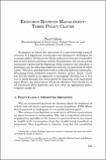Mostrar el registro sencillo del ítem
Resource revenue management: three policy clocks
| dc.contributor.author | Collier, Paul, 1949- | |
| dc.coverage.spatial | CHILE | es_ES |
| dc.date.accessioned | 2019-11-01T00:06:36Z | |
| dc.date.available | 2019-11-01T00:06:36Z | |
| dc.date.issued | 2014 | |
| dc.identifier.isbn | 978-956-7421-50-3 | |
| dc.identifier.uri | https://hdl.handle.net/20.500.12580/3839 | |
| dc.description | Economies in which the extraction of a non-renewable natural resource is a significant activity pose two distinctive challenges for economic policy: Revenues are likely to fluctuate because commodity prices have historically been volatile. Furthermore the revenue from extraction is generated by depleting a finite resource and therefore a potential case for offsetting depletion with the accumulation of other assets. Volatility and depletion work in radically different timescales. Managing them evidently requires distinct ‘policy clocks.’ Chile has led the world in its approach to managing volatility but it has yet to think through the issues posed by depletion with equivalent rigor. Hence my initial focus will be on whether Chile should be at all concerned about depletion and if so what an appropriate policy response might be. | |
| dc.format | ||
| dc.format.extent | Sección o Parte de un Documento | |
| dc.format.medium | p. 245-270 | |
| dc.language.iso | eng | |
| dc.publisher | Banco Central de Chile | |
| dc.relation.ispartof | Series on Central Banking Analysis and Economic Policies no. 22 | |
| dc.rights | Attribution-NonCommercial-NoDerivs 3.0 Chile | * |
| dc.rights.uri | http://creativecommons.org/licenses/by-nc-nd/3.0/cl/ | * |
| dc.subject | RECURSOS NATURALES NO RENOVABLES | es_ES |
| dc.subject | POLÍTICA ECONÓMICA | es_ES |
| dc.subject | PRODUCTOS BÁSICOS | es_ES |
| dc.title | Resource revenue management: three policy clocks | |
| dc.type.doc | Artículo | |
| dc.file.name | BCCh-sbc-v22-p245_270 |


